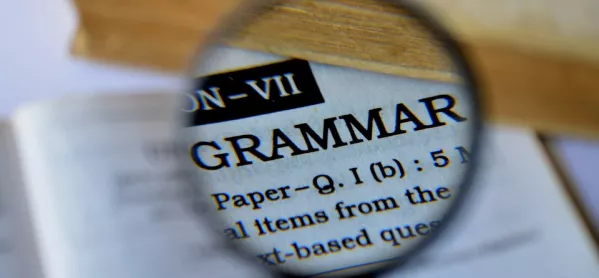The content of the newsletter from the Grammar School Heads Association, following meetings with ministers (and posted on Twitter by Tim Dracup), is remarkable in a number of ways. Not least their unguarded transmission of the contents of their discussions. I suspect they may not be as privileged in future as a result. Let’s ignore the unconvincing arguments about the funding formula and focus on the expansion of selection.
The newsletter shows the government continuing to work hard to build allies within the sector and mitigate some of the many objections raised. Although ’‘not an overwhelming flood of negativity” is not a high bar to set. As TES has pointed out, they are serious about this policy. And as we have pointed out, if you have to work this hard to mitigate the effects of your idea maybe it was a bad idea in the first place.
The current favoured concept seem to be super-selection - seeking the top 10 per cent of the ability range for admission to grammar schools. They also want to see pupils across the top 25 per cent of the range in local comprehensives. The thinking is not to damage neighbouring schools by taking away all the higher attaining students. Again, this points at an obvious flaw in the concept, but I also don’t think it will work. Grammar schools are a populist policy. They are explicitly justified on the grounds that they are popular. Under super-selection, there will be parents who believe their children deserve a grammar place who will be denied a grammar place and who will see lower attainers achieve a grammar place. The pressure for expansion, and lowering the bar, will be immense. This government has not shown that it would be willing to resist such pressures.
I have seen various sensible and well meaning people trying to find a way out for the government that will enable it to implement the policy without causing widespread damage. One suggestion is severely limiting the numbers of grammar schools. I think this shows that such a limit would be temporary at best. I am not a big believer in ‘thin end of the wedge’ thinking, but this seems a valid case.
Another idea floated in the newsletter is the quixotic search for the tutor-proof test. This can be found right next to El Dorado. Again, the attempts at mitigation point to key flaws - selection at 11 cannot be divorced from background. One solution proposed is to ask primary heads to identify possible candidates who might not perform well in the tests. I really cannot see many primary heads wanting to do this. It is intensely frustrating, though, that the government will support a form of teacher assessment when it suits their aims while deriding it elsewhere.
The final point is the money. Others have been eloquent on this point but, if we are serious about social mobility, that £150 million could be much better spent. Pump it all into high-quality early years education and you won’t have to worry about selection. Or use it to patch up the shortfall in high needs funding and help the most vulnerable in our society. But, apparently, it is not about social mobility any more but “social reform”. I don’t know what this means. I guess the beauty is that it could mean anything. Whenever grammar schools are proven not to contribute to a particular goal, the posts can be shifted with ease.
Russell Hobby is the general secretary of the NAHT headteachers’ union. He tweets @russellhobby




